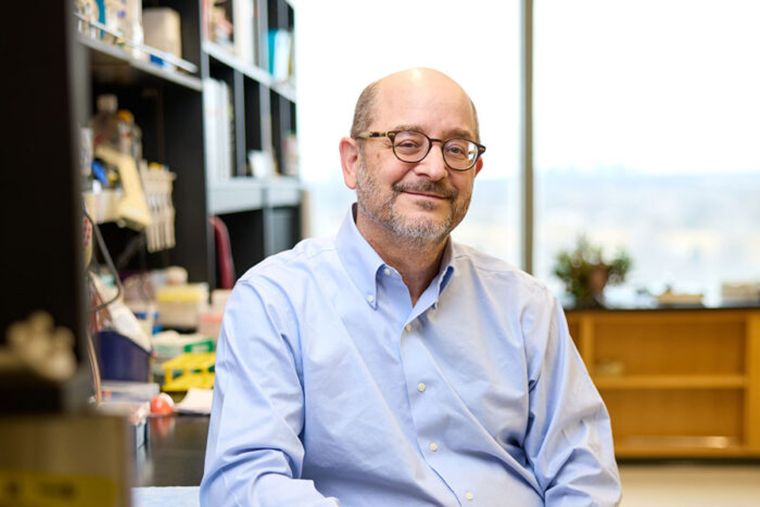
Continuing its role as a leader in leukemia research, Washington University School of Medicine in St. Louis has been awarded a five-year $10.8 million grant to further its exceptional programs in leukemia and other blood cancers.
The grant, from the National Cancer Institute (NCI) of the National Institutes of Health (NIH), renews funding for a prestigious Specialized Program of Research Excellence (SPORE) in leukemia. The NCI's SPORE program is designed to support translational research that moves discoveries from the lab to the clinic. The WashU Medicine leukemia SPORE is one of only two SPOREs in leukemia in the country.
Siteman Cancer Center, based at Barnes-Jewish Hospital and WashU Medicine, is one of a small vanguard of leading comprehensive cancer centers to have at least three SPORE grants. In addition to the leukemia SPORE, WashU Medicine also holds these prestigious programs of research excellence for endometrial and pancreatic cancers.
"Having an NIH-funded SPORE in leukemia - as well as in two additional cancer types - puts WashU Medicine in an elite category of cancer centers across the country," said principal investigator Daniel C. Link, MD, the Alan A. and Edith L. Wolff Endowed Professor of Medicine, director of the Division of Oncology in the Department of Medicine, and Siteman's deputy director. "Siteman is a real jewel in our community - a great resource for our patients to get cutting-edge cancer therapy from world experts in the field. Our No. 1 mission is to provide state-of-the-art compassionate care. The studies funded by the SPORE are among the most innovative in the field of blood cancer, and they're available right here in St. Louis."
Over the next five years, Siteman's leukemia SPORE will provide funding for four major research studies:
- Project 1, led by John DiPersio, MD, PhD, the Virginia E. & Sam J. Golman Professor of Medicine; Armin Ghobadi, MD, a professor of medicine; and Michael Rettig, PhD, a professor of medicine, involves the development of a new type of cell-based immunotherapy for T-cell acute lymphoblastic leukemia (T-ALL). They have engineered CAR-T cells from healthy donors that specifically recognize and kill T-ALL cells without attacking themselves or normal tissue. Early results from a first-in-human clinical trial of these engineered "off-the-shelf" allogeneic CAR-T cells in patients with relapsed T-ALL have been encouraging, according to the researchers.
- Project 2 is led by Todd Fehniger, MD, PhD, and Amanda Cashen, MD, both professors of medicine, and is focused on the development of a new type of cellular immunotherapy using natural killer (NK) cells. These "memory-like" NK cells were discovered at WashU Medicine and will be tested to treat patients who have relapsed after bone marrow transplantation. In addition, Fehniger and Cashen are working to engineer NK cells to enhance their recognition and killing of acute myeloid leukemia or other types of cancer.
- Project 3 is led by Matthew Walter, MD, the Edward P. Evans Endowed Professor of Myelodysplastic Syndromes at WashU Medicine, and Tim Graubert, MD, of Massachusetts General Hospital, and is focused on myelodysplastic syndrome (MDS) and acute myeloid leukemia (AML). The researchers are investigating whether blocking two proteins involved in DNA repair - ATR and PARP1 - is safe and effective against these blood cancers. They also will explore why some of these blood cancers are resistant to ATR inhibition, and they will work toward finding ways to circumvent that resistance with combination therapies.
- A fourth project is led by Link and Geoffrey L. Uy, MD, a professor of medicine, and involves patients with AML or MDS whose cancers have mutations in an important gene called TP53, which is the most commonly mutated gene in all cancer types. Link's team has shown that blood cancers with mutated TP53 are vulnerable to the combination of decitabine with drugs that inhibits the ATR pathway that is crucial for how cells respond to DNA damage. The project will support a first in-human clinical trial of this drug combination in patients with AML or MDS with TP53 mutations.
All four projects will be supported by core resources funded by the SPORE, including a biospecimen processing core, a biostatistics and bioinformatics core and an administrative core. The grant also funds a career-enhancement program to help recruit, train and mentor new researchers focused on the investigation and treatment of blood cancers.
"Training the next generation of physician-scientists is key to ensuring that we have the people and systems in place to take the newest discoveries and translate them into treatments that can improve patient care," Link said. "We're looking forward to the next years of discovery that this grant renewal makes possible."
The Washington University School of Medicine SPORE in leukemia is supported by NIH grant number 2P50CA171963-11A1. The content is solely the responsibility of the authors and does not necessarily represent the official views of the NIH.
About Washington University School of Medicine
WashU Medicine is a global leader in academic medicine, including biomedical research, patient care and educational programs with 2,900 faculty. Its National Institutes of Health (NIH) research funding portfolio is the second largest among U.S. medical schools and has grown 56% in the last seven years. Together with institutional investment, WashU Medicine commits well over $1 billion annually to basic and clinical research innovation and training. Its faculty practice is consistently within the top five in the country, with more than 1,900 faculty physicians practicing at 130 locations and who are also the medical staffs of Barnes-Jewish and St. Louis Children's hospitals of BJC HealthCare. WashU Medicine has a storied history in MD/PhD training, recently dedicated $100 million to scholarships and curriculum renewal for its medical students, and is home to top-notch training programs in every medical subspecialty as well as physical therapy, occupational therapy, and audiology and communications sciences.
Originally published on the WashU Medicine website






